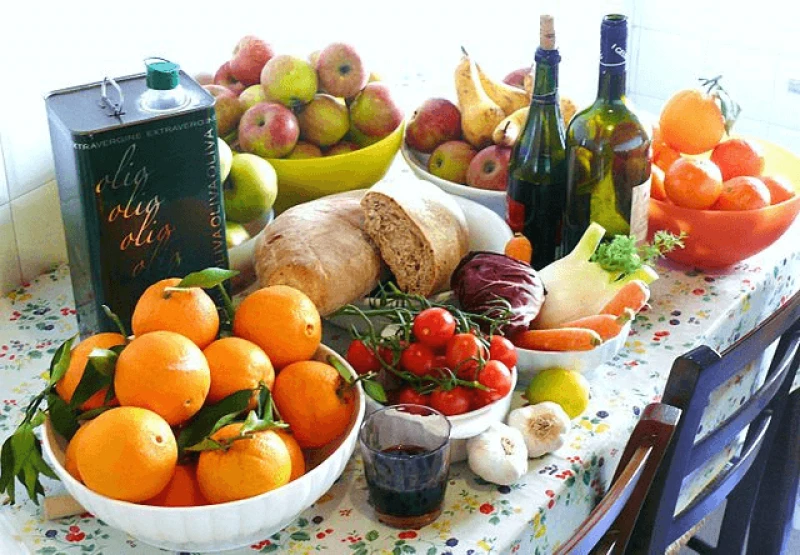Foods can fight inflammation. Here’s what to eat to reduce your risk of cardiovascular disease, stroke and more
Foods can fight inflammation. Here’s what to eat to reduce your risk of cardiovascular disease, stroke and more


In the last few decades, researchers including [surgical oncologist Jennifer] Wargo have accumulated evidence to support some key ingredients in a healthy diet that most effectively control inflammation and reduce the risk of cardiovascular disease, cancers, and other illnesses. Now, scientists are zeroing in on the community of bacteria that lives in our digestive systems—the gut microbiome—as the place where specific foods and ingredients, including fiber, elicit or inhibit inflammatory reactions that ultimately affect the trajectory of diseases and response to cancer treatment.
In modern times, inflammation has become a popular target for healthy eating, as a bulk of studies have accumulated to link a variety of foods and diets with both lower rates of disease and lower levels of inflammatory molecules circulating in the blood.
…
Although the true magnitude of these benefits remains a topic of debate—in part because studying diet is complicated and because people who eat healthier diets also often adopt other healthy behaviors—numerous studies have found lower levels of inflammatory molecules in the blood in people who eat Mediterranean-style diets. Studies in lab dishes, animals, and people also find anti-inflammatory responses to specific nutrients and ingredients, including turmeric, oily fish, apples, avocados, carrots, and leafy greens.
This is an excerpt. Read the original post here

 | Videos | More... |

Video: Nuclear energy will destroy us? Global warming is an existential threat? Chemicals are massacring bees? Donate to the Green Industrial Complex!
 | Bees & Pollinators | More... |

GLP podcast: Science journalism is a mess. Here’s how to fix it

Mosquito massacre: Can we safely tackle malaria with a CRISPR gene drive?

Are we facing an ‘Insect Apocalypse’ caused by ‘intensive, industrial’ farming and agricultural chemicals? The media say yes; Science says ‘no’
 | Infographics | More... |

Infographic: Global regulatory and health research agencies on whether glyphosate causes cancer
 | GMO FAQs | More... |

Why is there controversy over GMO foods but not GMO drugs?

How are GMOs labeled around the world?

How does genetic engineering differ from conventional breeding?
 | GLP Profiles | More... |

Alex Jones: Right-wing conspiracy theorist stokes fear of GMOs, pesticides to sell ‘health supplements’




 Viewpoint — Fact checking MAHA mythmakers: How wellness influencers and RFK, Jr. undermine American science and health
Viewpoint — Fact checking MAHA mythmakers: How wellness influencers and RFK, Jr. undermine American science and health Viewpoint: Video — Big Solar is gobbling up productive agricultural land and hurting farmers yet providing little energy or sustainabilty gains
Viewpoint: Video — Big Solar is gobbling up productive agricultural land and hurting farmers yet providing little energy or sustainabilty gains Fighting deforestation with CO2: Biotechnology breakthrough creates sustainable palm oil alternative for cosmetics
Fighting deforestation with CO2: Biotechnology breakthrough creates sustainable palm oil alternative for cosmetics Trust issues: What happens when therapists use ChatGPT?
Trust issues: What happens when therapists use ChatGPT? 30-year-old tomato line shows genetic resistance to devastating virus
30-year-old tomato line shows genetic resistance to devastating virus California, Washington, Oregon forge immunization alliance to safeguard vaccine access against federal undermining
California, Washington, Oregon forge immunization alliance to safeguard vaccine access against federal undermining The free-range chicken dilemma: Better for birds, but with substantial costs
The free-range chicken dilemma: Better for birds, but with substantial costs ‘You have to treat the brain first’: Rethinking chronic pain with Sanjay Gupta
‘You have to treat the brain first’: Rethinking chronic pain with Sanjay Gupta
